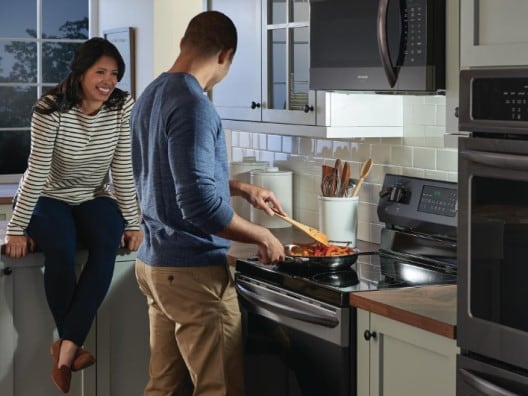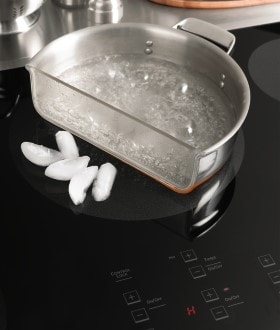Induction Cooktops - Safer for You and the Environment
Posted on February 20, 2023 By Mike M
If you've shopped around for kitchen appliances in the last few years, you may have heard of induction cooking. Though induction cooking is still relatively new, you can find a variety of cooking appliances that utilize this efficient technology. On top of the many added conveniences that come with this cooking method, induction-based appliances are an incredibly safe option for both you and the environment. Here's a closer look at induction cooking, and why it's such a great option for your kitchen.
How Does an Induction Stove Work?
Induction stoves and induction cooktops are designed with smooth, level surfaces with electromagnetic coils positioned below each burner. Many models typically feature multi-sized induction zones so you can make use of cookware of different sizes. When you put your induction-ready cookware on your induction cooktop/stove and turn it on, an electromagnetic field passes a current straight through the induction-safe cookware. In turn, the cookware itself becomes the heat source, while leaving the surface of the appliance cool. A good way to see if your cookware is induction-ready is to try sticking a magnet to the bottom. If the magnet sticks, it's good to use. For a deeper dive on how induction works, check out our "What Is Induction Cooking?" blog article.
Is Cooking with Induction Healthy?
Your food will still end up as delicious and nutritious as it would be if you cooked with gas or traditional electric appliances. If anything, the only major difference you'll find when you cook with an induction appliance is that your food will be ready sooner!

Are Induction Cooktops Safe?
Due to the very nature of induction cooking, most of the time it's going to be significantly safer than a gas or electric cooktop. Since induction cooktops don't make use of gas, you'll never need to worry about breathing in harmful fumes. Since there are also no open flames, the risk of a kitchen fire is also extremely low. Induction-based appliances never actually heat up their cooking surfaces; they simply send currents directly into whatever cookware you're using. The stove surface never heats up, virtually eliminating the threat of burns from coming into contact with a hot stovetop. However, your cookware itself will get hot, and it'll get hot fast, so you should still exercise caution when it comes to handling your cookware.
Is Induction Cooking Better for the Environment?
If you're looking to create a greener kitchen, induction cooktops are a great choice. Food cooked with induction will receive 90% of the heat generated, compared to 65-70% for electric and 40-55% for gas. Their extreme efficiency when it comes to heating up allows them to use less energy, which not only will lower your power bills but will also be less environmentally impactful.
Are Induction Cooktops Good at Cooking?
Induction cooking isn't just safer - it's also faster. Many models of induction cooktops can bring water to a boil in roughly two minutes, greatly reducing prep time for a variety of recipes. Due to the fact that induction stoves heat up the cookware itself, you'll also find that this type of heating will cause your food to be cooked evenly. Induction cooktops also come with smooth surfaces, so cleanup will always be super easy if you have a spill. The lack of heat on the cooktop's surface will also ensure that no food will ever get burnt onto it, so you can keep it looking as good as the day you got it.
There's a lot to love about induction cooktops and induction ranges. Whether you're interested in their incredible cooking capabilities, their exceptional safety features or their energy efficiency, these appliances make a fine addition to any kitchen.
Shop Popular Induction Cooktop Sizes
